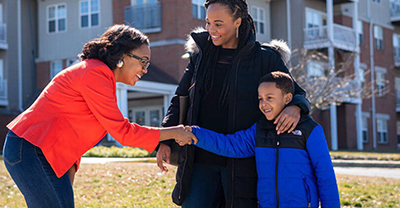
By Phylicia Porter
In a city more widely known for its high crime rate than for its rich history, beautiful harbor, or world-renowned hospitals, Phylicia Porter’s story of growing up in West Baltimore is a familiar tale to many — one that she recognizes can seem out-of-reach for other Baltimoreans, given the sacrifices required to overcome systemic challenges.
“You know, I like to tell people that I’m the product of the investment in the youth of this city because it’s easy to forget when I’m all cleaned up and sitting in front of you. But it’s true; I’m Baltimore born, raised, and educated,” Porter tells me as we sit down to discuss her rise from West Baltimore to the youngest member of the 2020–21 Baltimore City Council.
“I understand that this city can sometimes feel like the deck is stacked against you. I know what it’s like to grow up not seeing Mom, or Dad, as often as you’d like because it seems like they’re always working.”
Porter’s parents — Reggie and Freida — worked as many as four jobs for as long as she can remember, willing to work themselves ‘half to death,’ in Porter’s words, for a chance at better opportunities for Porter and her brother Marcus.
“My parents worked so hard and sacrificed so much when I was growing up just so they could send my brother and I to better schools — but they shouldn’t have had to.”
That’s why one of the ‘prongs’ in Porter’s 4-pronged policy vision for her District 10 community in South Baltimore, Building Safe and Healthy Communities, focuses on making sure the city has better community schools and resources for youth.
Afterschool programs and youth resources — programs that are too frequently the target of budget cuts and are often thought of as solely ‘for the youth’ — are as much an asset to parents as they are to children. Porter recognizes that without these resources, her parents couldn’t have made the sacrifices they made, unless they wanted to spend their working hours worrying about Porter and her brother “running wild on the streets while they busted their tails at work,” like so many neighborhood children are left to do when their parents have run out of options or community resources.
“If it weren’t for my parents’ sacrifices, I sure wouldn’t have managed to pay my own way through two Bachelors of Science degrees, a Masters in Public Health, and a Masters of Science in Law. I doubt I’d be a Public Health practitioner today; I probably wouldn’t be a City Councilwoman. And that’s the story of too many young Black men and women in this city.”
In a city with such a legacy of residential segregation, the block on which you’re born can easily determine your trajectory in life. That’s why Porter is convinced a public-health approach to the myriad issues that plague Baltimore is just as critical as legislative fixes are when it comes to addressing deeply systemic challenges. “I’ve always been super involved in my community; I think my parents instilled in me this idea of staying busy and only getting into ‘good trouble,’ to evoke a little John Lewis here. I’ve been doing all this behind-the-scenes work for years,” Porter explains.
She’s referring to her previous work for the South Baltimore Gateway Partnership, where she advocated for more than $30MM in funding to uplift the South Baltimore communities, her work on the Democratic Central Committee, and her involvement in numerous community organizations and non-profits.
“I started to see that there was this need in my community. And so, in true Phylicia form, I filled it. I didn’t wait for an election, or for someone to invite me to step in. I built the relationships and the knowledge base that I knew would help me get things done.”
And that’s how she spent the next year: in living rooms and on front porches throughout her City council district, building relationships with communities that felt like nobody had been paying them any mind for years. The message was clear.
“The one thing I heard consistently was that many community members feel our City is in decline. As a public-health practitioner first, I see that decline as an opportunity.”
Opportunity for what exactly? Porter believes her Building Healthy Communities initiative provides the missing piece of the puzzle that will help build her district, and eventually the City, back again.
“It’s about understanding how good outcomes for people, communities, and our city are based on the connections between people. We have to focus on improving the connections between communities and the resources, services, and programs that the city government and its partners deliver to make a difference.”
Porter believes that South Baltimore is due for a Renaissance — a Renaissance she believes her policy vision will be instrumental in achieving. To read more about Phylicia Porter and the work she’s doing in South Baltimore, visit https://www.porter4baltimore.com/platform-1.


Be the first to comment